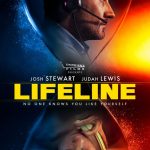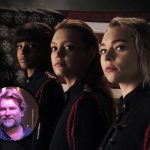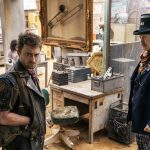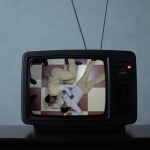LA Comic Con 2024 interview: Only Murders in the Building’s Shelly Westerman and Payton Koch
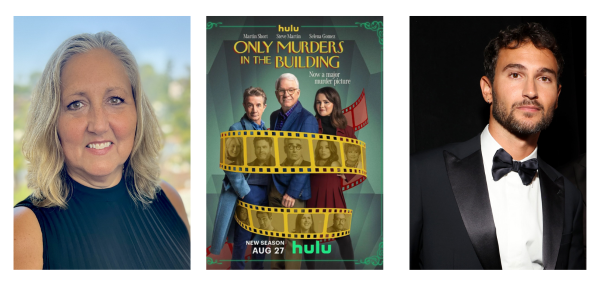
On the second day of LA Comic Con, Impact24 held the panel “Post-Production Workshop: Behind-the-Scenes of Film and TV”. Four creatives came together to show what a post-production meeting looks like and walk the audience through their process. I had a chance to interview Only Murders in the Building’s Shelly Westerman (co-producer and editor) and Payton Koch (editor).
Since the panel was about being behind the scenes of the industry, I first asked how someone would get into the field of editing for film and television.
“I grew up making little movies with my family on iMovie, and it was always something that I was passionate about,” said Koch. “I was very inspired by filmmaking. I went to Chapman University – Dodge College of Film and Media Arts, and I studied film production and emphasized in editing. That was the start of my journey. When I was graduating, I knew I wanted to work right away – so I weaseled my way into a post-production PA job on American Horror Story.”
It was there that Koch met Westerman, who he considers a mentor. “I had a different career,” Westerman said with a smile. “I started at the Federal Reserve Bank in Atlanta, Georgia, in computer operations, but knew I wanted to work in film. I got a degree in film at Georgia State. Knew I had to get to New York or LA if I was serious about a film career. While in Atlanta, I volunteered at film festivals and independent film organizations. I got to New York, transferred to the Fed New York, did the same thing in New York – joined Film Independent, volunteered at festivals, whatever I could do to become part of the community.
“And then someone gave me a tip and said, ‘Hey, there’s this postproduction house looking for interns.’ So, I took a leave of absence at the Federal Reserve, and I went and interned at a place called Spin Cycle Posts. I was learning how to make leaders and do things on 35-millimeter film and the Avid. And then somebody said, ‘Hey, there’s a film that needs an assistant called Velvet Goldmine. It was this super cool indie film.’ So, I turned in my notice at the Fed, and then started on Velvet Goldmine. And that was my entry into the film world.”
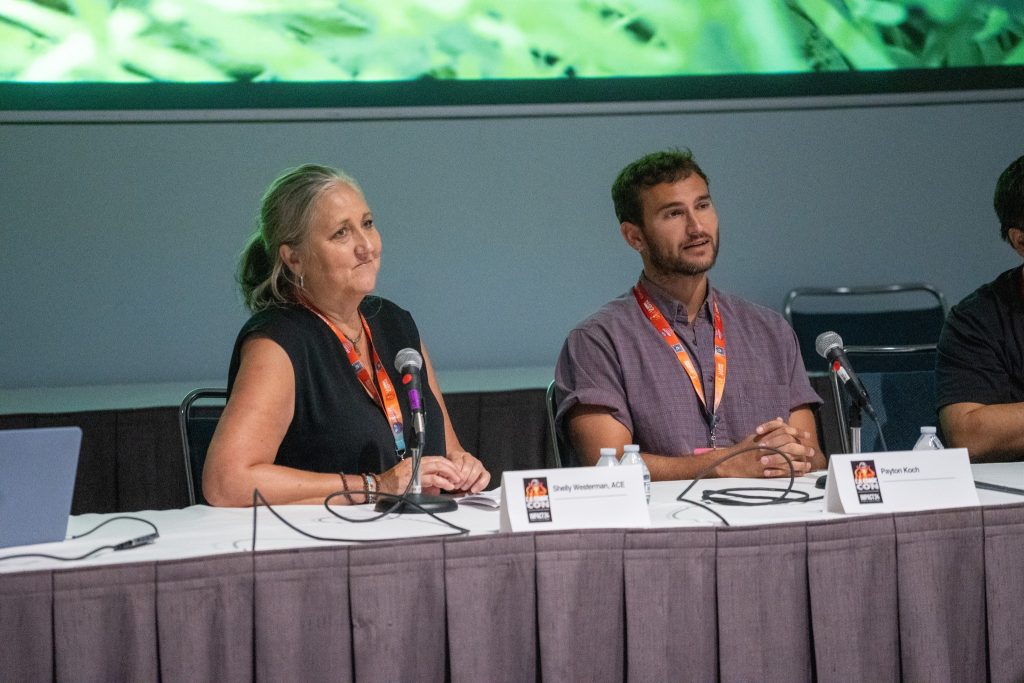
I next asked what the easiest/most fun part of their job is. “I would say the easiest part is probably watching dailies and enjoying watching these actors perform,” Koch said. “Especially on a show like Only Murders, where you have a huge cast of amazing comedians and various actors. It’s just so fun to watch them work and you feel like you’re there with them. I think that’s the most fun part. And then, when your cut is assembled and it’s done: I find it so satisfying to sort of zoom out on your timeline and see it all and be like, ‘Oh my God, look at that. It looks so nice.'”
“That was my same reaction,” Westerman said. “Dailies are like your sacred time: that’s my private time. I watch everything from beginning to end. It’s where I feel the most creative. I’m laughing at Steve [Martin] and Marty [Short] and the jokes. I’m just having a good time.”
This of course led into what the hardest or the least favorite part of the job is. “The hardest is sometimes making that first cut and deciding what to do, where to go, and getting stuck a little bit,” Westerman continued. “You get a little bit of afraid, and you’re like, ‘You know what? It doesn’t matter. Make a cut, any cut, just move on and it’ll be okay.’ But there’s usually that moment of, ‘oh my God, how do I even start this?'”
As for Koch? “The hardest part is when you might love something so much that you did that was your idea, and then a director or producer will come in and they’ll want to change it,” he said. “Letting go of your initial vision and being open to their vision, you know what I mean? So that’s always a hard thing for me that I have to let go. This is bigger than me. It’s also their project.”
I wanted to talk to Westerman especially about sexism in the industry. “Being in a very technical environment, sometimes it’s hard to assert yourself: that I do know,” she said. “I do know what I’m talking about regarding the Avid, but oftentimes you’ll get talked down in that way. But you stay calm. I would say I was lucky enough to have early female mentors who kind of normalized females in the workplace. I worked with Nora Ephron, who set a good example of strong female leadership. I was grateful to have that because it made me not as afraid of some of the misogyny.”
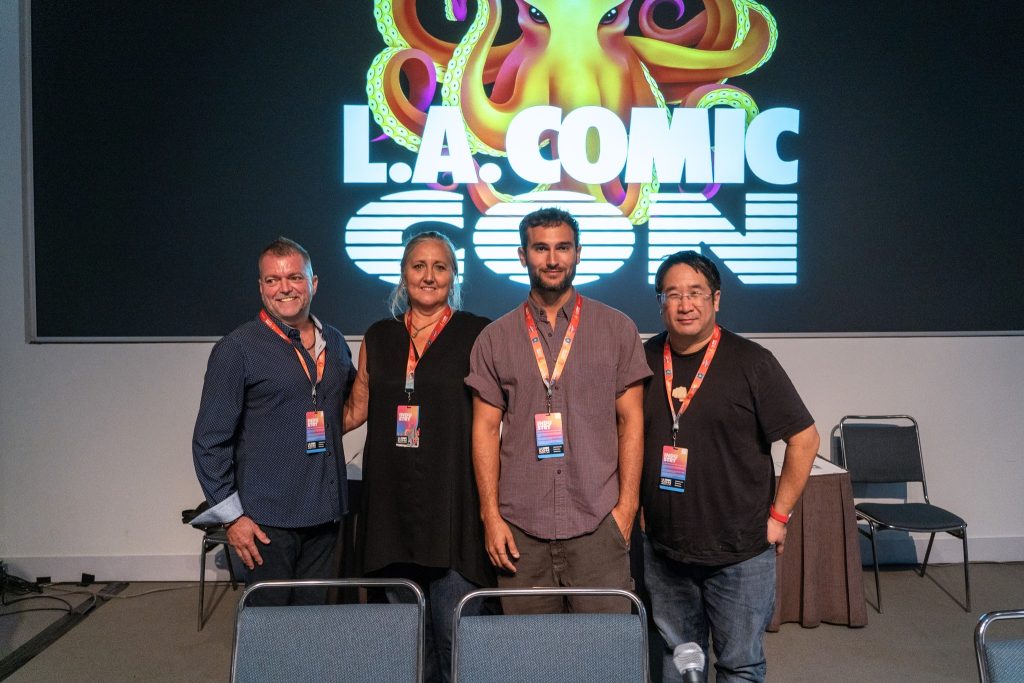
As a creative person myself, I always like to hear about the moment where someone realizes that they can do their work as a living, not just as ‘a hobby’ or for fun. ” It came about a little later into my career,” Westerman said. “It was working on some of the Ryan Murphy projects. I did the pilot for American Crime Story: Versace, and it was really hard and really challenging and I worked on my editor’s cut for months. And it was successful. Ryan won an Emmy® Award. Darren Criss won an Emmy® Award. It was very satisfying to know that something I worked on so hard and so long was successful. I was proud of my work. After that, it gave me a lot more confidence to know I could tackle anything.”
“It’s actually funny,” Koch said. “When I was going to school for editing, I knew I wanted to do this as a career regardless. I wasn’t even thinking about the future. But I remember finding out that editors make decent money. And I was like, Oh, I could, this is a career for your real life. I went in with the art: I’m passionate about this medium of storytelling. And then realized, oh, like, this is your life and it’s possible to do your art and something that you love and also be able to live off of it and make a living. I just feel so lucky that we get to do this craft and it’s a job.”
Hollywood is well-known for the transitory nature: projects last weeks, maybe months – and if you’re lucky years. So I asked how easy it is nowadays to find editing jobs, especially since there have been massive cuts at many studios. “It is not as easy as you would think,” Koch said, “especially after the last few years with the pandemic, and then with the strikes happening. It’s been slim pickings for a lot of people, and it’s been tough.”
“I’ve gotten a few calls here and there for things, which is promising,” Westerman said. “I was finishing up Murders, and then needed to take time off until season five starts. So I immediately called all my friends and said, ‘Make sure your agent follows up on this show.’ Whatever tips we get, we share, but there’s only been a few things, so we feel very fortunate.”
Since Koch called Westerman a mentor, I asked them both what advice they’d give to people just starting out in the business. “Something that I always tell to other people that might want to be getting into this business or just starting out in post-production is to just tell people what you want to do when you come into an edit room,” Koch said. “If you want to edit, tell someone; because then they’re going to see that you’re passionate and they’re going to sit with you and you can learn from them. When I started, I asserted myself in these rooms. All the assistants are doing all their sound work and turnovers, and I’d sit with them and take notes and learn. I think people in Hollywood like passion, and if there’s someone that’s interested and they’re going to do anything to get this job or prove their worth, you’re going to make it.”
“The other thing that everybody tells every editor: networking,” Westerman said. “Develop your network and your friendships. Like Payton was talking about, one of his first films that really affected him was Whiplash: I happen to know that editor, we were assistant editors back in the day in New York in the late ’90s. And we’re all still friends to this day, and we all still call each other for support. We’re all editing: some bigger things, and some of us on TV, and some of us in movies. But it is about the network that you create: the friendships, the network, the connections, the collaborations.”
Only Murders in the Building just wrapped up its fourth season. You can binge the full series on Hulu. You can also watch the full LA Comic Con panel on Impact 24’s YouTube channel. My interviews with the other two panelists, composer Darren Fung and supervising sound editor and mixer John Chalfant, will be in a separate post.
Author: Angie Fiedler Sutton
Angie Fiedler Sutton is a writer, podcaster, and all-round fangirl geek. She has been published in Den of Geek, Stage Directions, LA Weekly, The Mary Sue, and others.
She also produces her own podcast, Contents May Vary, where she interviews geeky people about geeky things. You can see all her work (and social media channels) at angiefsutton.com.
Help support independent journalism. Subscribe to our Patreon.
Copyright © The Geekiary
Do not copy our content in whole to other websites. If you are reading this anywhere besides TheGeekiary.com, it has been stolen.Read our

